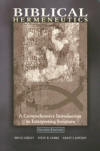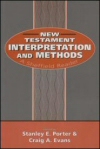Hermeneutics and Interpretation Bundle (3 vols.)
Digital Logos Edition
Overview
These three essential volumes on hermeneutics and biblical interpretation are the core textbooks on the subject. Providing a sweeping and comprehensive overview of biblical hermeneutics—with enough precise detail to walk readers through verse-by-verse interpretation through multiple methodologies—these volumes have set the standard for hermeneutic textbook instruction. Students, professors, and pastors will not want to be without these books in their library.
Logos helps you get the most out of your studies in hermeneutics and interpretation. Find and instantly navigate to the page you need by searching by topic or scrolling through the Contents Pane, and within seconds find the chapter or article you need. Scripture references and cross-references to other hermeneutical studies will appear on mouseover, giving you the option to go deeper and take your learning further than ever.

- Title: Hermeneutics and Interpretation Bundle
- Volumes: 3
- Pages: 1,487

The Hermeneutical Spiral was the 1993 Christianity Today Critics’ Choice Award winner in the theology and biblical studies category.
In this newly revised and expanded edition, Grant Osborne provides seminary students and working pastors with the full set of tools they need to move from sound exegesis to the development of biblical and systematic theologies and to the preparation of sound, biblical sermons. Osborne contends that hermeneutics is a spiral from text to context—a movement between the horizon of the text and the horizon of the reader that spirals nearer and nearer toward the intended meaning of the text and its contemporary significance. He develops his thesis in each of three sections: the first covering general hermeneutics (grammar, semantics, syntax, backgrounds), the second covering hermeneutics and genre, and the third covering applied hermeneutics. Along the way, he offers assessments of recent developments from redaction criticism to reader response criticism. In two appendixes, he also addresses the contemporary philosophical challenges to fixed meanings in texts and discusses the implications of this debate for biblical authority.
Well-established as the standard evangelical work in the field since its first publication in 1991, this updated edition of The Hermeneutical Spiral meets the needs of a new generation of students and pastors. General revisions have been made throughout, new chapters have been added on Old Testament law and the use of the Old Testament in the New, and the bibliography has been thoroughly updated.
About Grant R. Osborne
Grant R. Osborne (PhD, University of Aberdeen) is professor of New Testament at Trinity Evangelical Divinity School and series editor for the IVP New Testament Commentary Series. He has written The Resurrection Narratives and Three Crucial Questions about the Bible. He has also authored commentaries on Revelation, Romans, and John, and co-edited the Life Application New Testament Commentary. He coauthored Handbook for Bible Study and The Bible in the Churches. Dr. Osborne was also one of six editors in charge of the New Living Bible.

Biblical Hermeneutics is designed for students and ministers who want to grow in their ability to interpret, teach, and preach God’s Word. It requires no understanding of biblical languages or of the technical details of hermeneutics, but it does provide the reader with a working knowledge of the multi-faceted nature of biblical interpretation and with support for the practice of exegesis. The book is divided into five sections and among the important subjects are: the history of biblical interpretation, philosophical presuppositions, biblical genre, the uniqueness of Scripture, the practice of exegesis, and the use of exegetical insights in preaching and teaching. This revised edition contains seven new chapters that deal with interpreting the major literary genre of Scripture: law, narrative, poetry, wisdom, prophecy, the Gospels and Acts, the epistles, and apocalyptic literature. It also includes two extensive appendices: a glossary for biblical studies, and an updated and expanded guide to reference books and Biblical commentaries.
You will learn:
- A step-by-step approach to interpreting a passage
- Hermeneutical principles that apply to both Testaments
- How the history of interpretation and recent developments in the philosophy of language contribute to being able to interpret the biblical text today
- How to move from theoretical understanding to practical application
- How to contextualize biblical teaching in a variety of cultural contexts
- How to prepare a sermon that draws on a whole range of interpretive tools and is sensitive to biblical genre
About the Editors
Bruce Corley is president of B. H. Carroll Theological Institute where he is a professor of New Testament and Greek. His professional experience includes memberships in the Society of Biblical Literature, the Institute for Biblical Research, and the National Association of Baptist Professors of Religion where he has held elected offices and worked on the editorial boards of two journals. He received an MDiv and ThD from Southwestern Baptist Theological Seminary.
Steve W. Lemke is provost and professor of Philosophy and Ethics at New Orleans Baptist Theological Seminary. He earned an MDiv and PhD from Southwestern Baptist Theological Seminary.
Grant I. Lovejoy is professor of preaching at Southwestern Baptist Theological Seminary.

In this essential volume on interpretation and methods, the reader will find ground-breaking studies that introduce new critical questions and move into fresh areas of enquiry, surveys of the state of play in these particular fields of New Testament study, and articles that engage with each other in specific debates. This volume will make an excellent textbook for students.
Collecting outstanding articles from the first 50 issues of the Journal for the Study of the New Testament, this volume examines New Testament interpretation and methods from a variety of viewpoints. In two sections, “Principles” and “Practice,” distinguished scholars contribute essays on a number of important topics. Contributors include Christopher M. Tuckett (“The Griesbach Hypothesis in the Nineteenth Century”), F. Gerald Downing (“Redaction Criticism: Josephus’s Antiquities and the Synoptic Gospels”), Frances M. Young (“The Pastoral Epistles and the Ethics of Reading”), and many others.
About the Authors
Dr. Craig A. Evans received his PhD in New Testament from Claremont Graduate University and his DHabil from the Karoli Gaspar Reformed University in Budapest. He is the John Bisagno Distinguished Professor of Christian Origins at Houston Baptist University in Texas.
Evans taught at Trinity Western University in British Columbia for 21 years, where he directed the graduate program in biblical studies and founded the Dead Sea Scrolls Institute. He has recently served on the advisory board for the Gospel of Judas for National Geographic Society and has appeared frequently as an expert commentator on network television programs.
Evans has written and edited extensively on the historical Jesus and the Jewish background of the New Testament era. His published works include From Prophecy to Testament, Jesus and the Ossuaries, Jesus: The Final Days, and Dictionary of New Testament Background.
Stanley E. Porter is principal, dean and professor of New Testament, McMaster Divinity College, Canada. He is a respected Greek and New Testament scholar, and has written dozens of books on the subject, including Idioms of the Greek New Testament, A Handbook to Exegesis of the New Testament, and Handbook of Classical Rhetoric in the Hellenistic Period.
Reviews
18 ratings


David Anfinrud
11/21/2021
They are in my library. Will keep an eye on when I can use various parts of them. I have so many books I want to read cover to cover. I will never get it done. Wish I had a photographic memory. But always so many blessings are found by using techniques others have used and add them to being tools of studying.
Forrest Cole
11/9/2021

Rev. Robert Sundquist
9/20/2018
Chris
6/24/2017
Jeffrey J H Marshall
5/28/2017
Mikel DeSilvis
2/15/2017

Ray Martinez
2/9/2017
Most excellent! It is really my first experience with Hermeneutics and interpretation.
Tim Wilkey
5/28/2016